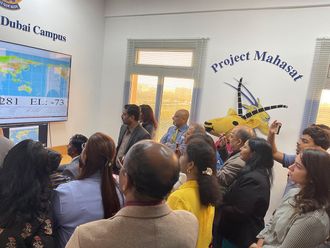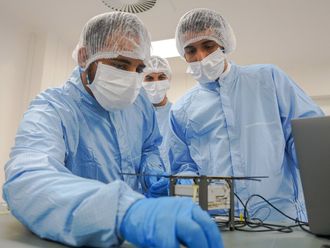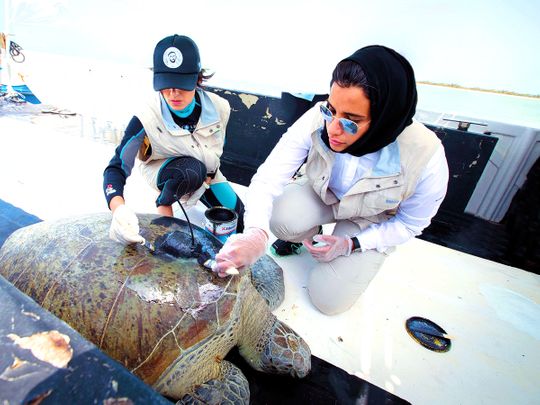
Abu Dhabi: An Emirati woman official has said two Emirati fishermen in their 80s, whom she met as part of her work, changed her outlook towards life.
“I felt I should be a ‘fisherman’. I wish I could stay healthy with age like them. They are healthier and more energetic and enthusiastic than any youngsters … and I was looking for the reasons,” said Shamsa Mohammad Al Hameli, Assistant Scientist — Fisheries at the Environment Agency — Abu Dhabi.
“The major reason is … they have been close to nature in their entire life. This inspires me to appreciate my work, which is close to nature,” she said in an interview with Gulf News, in which her colleagues working in marine conservation sector also participated.
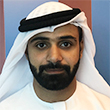
We collect production data from farms and prepare statistical reports, which will help further development of the sector. We ensure that farms maintain high standards and sustainable practices.
They shared their experiences in marine conservation as they will be part of several activities related to the sixth edition of the World Ocean Summit, which will be held from March 5 to 7 in Abu Dhabi, the very first time in the Middle East.
Al Hameli, 28, said she interacted with the elderly Emirati fishermen as part of her study of a traditional fishing method called ‘Hadrah’ that uses a circular net fixed in water close to the coast.
“The experience changed the way I look at fishermen; I started seeing them in a different way.”
She said their early mornings, discipline and hard work made them strong and pleasant individuals.
“Their work is tiring; still they are very active and keep a positive attitude.”
They happily cooperated with her for the study and appreciated the EAD’s efforts for sustainable fishing and protecting the marine environment and fish stocks.
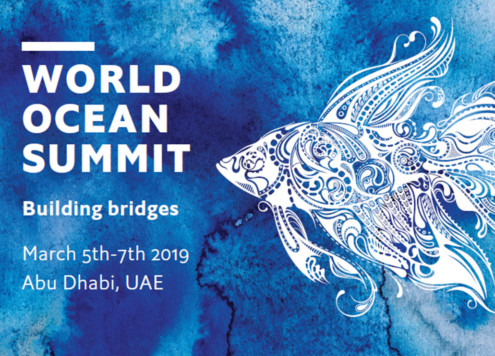
“If any endangered marine animals or fish are trapped in their nets, they always release them back into the water. This shows that they are practising what they learn from the EAD’s awareness drives on endangered species,” Al Hameli said.
“It proves their love for the sea, which was their only reliable source to sustain their life in the past. They have a different view of life. They want their sea and marine life to be protected always,” she said.
Her sister, Maitha Al Hameli, a lead specialist of marine species and habitats who has worked with the EAD for ten years, said her involvement in marine habitat surveys enlightened her about the rich biodiversity of the UAE, which to the untrained eye may look like a barren land.
“Observing habitats of dugongs, turtles, dolphins, seahorses and corals etc was a wonderful experience. The dugong is my favourite animal, which taught me about the fragile marine habitats, especially seagrass. They are resilient to all existing threats and survive!” Maitha said.
Sighting finless porpoise, a marine mammal the looks like dolphin, during the surveys was a rare opportunity.
“It is difficult to spot them … they have a very small population here,” she said.
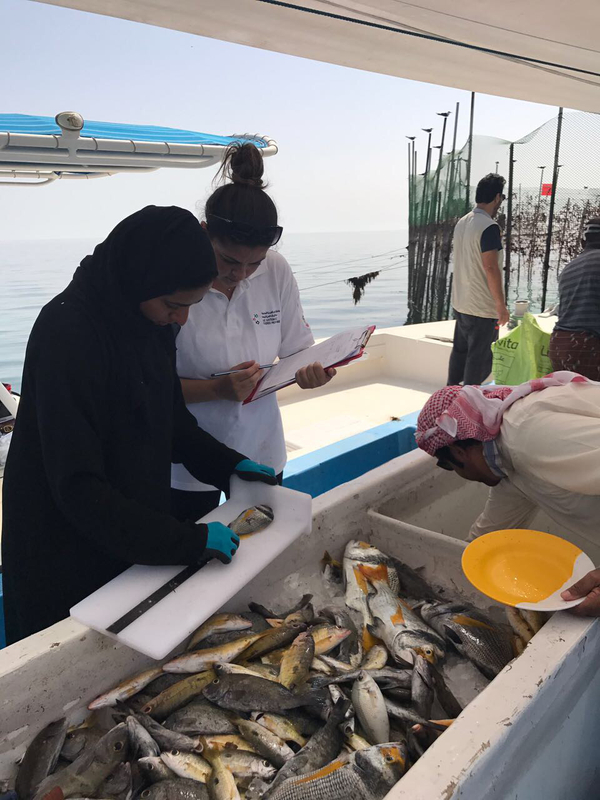
Kholood Al Jaberi, 22, an analyst of Marine biodiversity Policy, said her interaction with the spearfishing community proved their commitment towards conservation of fish stocks.
They suggested putting certain restrictions on fishing Hammour, orange-spotted groupers, disregarding its impact on their income.
She enjoys interacting with public as part of the EAD’s surveys on various environmental issues.
“People are always willing to share their time to give feedback,” she said.
Hamed Al Mansouri, 27, an aquaculture specialist at the EAD, said he was proud to work in aquaculture, which the UAE government has identified as a key sector for food security.
He enjoys inspecting farms of various marine species, including shrimp and oysters.
“We collect production data from farms and prepare statistical reports, which will help further development of the sector. We ensure that farms maintain high standards and sustainable practices,” Al Mansouri said.
The environmental impact studies will ensure averting negative impacts of farms on the local environment.
“We encourage Emiratis and other residents to invest in this sector … it is lucrative and benefits the nation by supporting food security while minimising the pressure on wild fish stock,” Al Mansouri said.
World Ocean Summit and Abu Dhabi Blue Week
The World Ocean Summit will also be part of a series of activities celebrating the UAE’s rich seafaring traditions during the inaugural Abu Dhabi Blue Week, running from March 3 to 7.
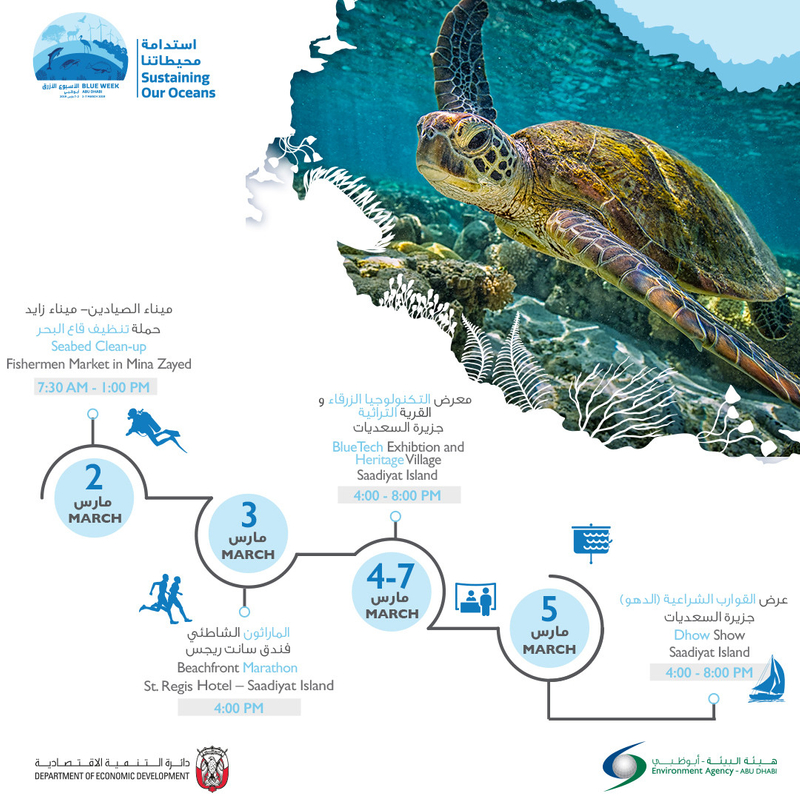
The events during the week will feature a Heritage Village, a Dhow Show, a Beach Marathon, a Youth Circle discussion focusing on the importance of ecotourism and a Blue Technology Exhibition by participating government entities, along Saadiyat Beach.
Held under the patronage of His Highness Shaikh Mohammad Bin Zayed Al Nahyan, Crown Prince of Abu Dhabi and Deputy Supreme Commander of the UAE Armed Forces, The World Ocean Summit will be attended by over 500 delegates, including heads of state, political leaders, policymakers, corporate heads and academics from more than 26 countries.
They will discuss how best to innovate, govern and promote a sustainable blue economy, and explore new ways to mitigate the adverse impacts of human pressures on ocean health.
Hosted by the Abu Dhabi Government and supported by the Environment Agency — Abu Dhabi (EAD) and the Abu Dhabi Department of Economic Development (DED), the summit will be held at the St. Regis Saadiyat Island Resort from March 5 to 7.



